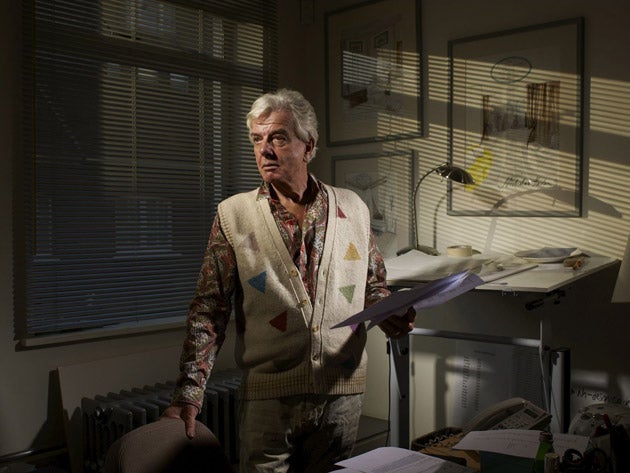Last Night's Television - Horizon, BBC2; Imagine...BBC1; Storyville: Hi Society – The Wonderful World of Nicky Haslam, BBC4
After the ball is over

For the socialite and interior designer Nicky Haslam a surprising number of things turn out to be fun. Having a stalker, for instance: "So chic," he said brightly in Storyville: Hi Society – the Wonderful World of Nicky Haslam. "We should all have one." Or spending three years of his childhood paralysed with polio ("It was rather fun"). Or the hazards of pre-Wolfenden homosexuality ("It was illegal still so that made it much more fun"). He's also got a very long list of things that he thinks are common, including swans, pronouncing the last t in "trait", scented candles, wheat intolerance, loving your parents and queuing at Annabel's. Fortunately, he probably doesn't have to do a lot of the latter because Nicky is to the London scene what the silver lady is on a Rolls-Royce. He attends up to five parties a night to exchange air kisses and squeals of delighted recognition before moving on, ceaselessly driving on through the crowd to where the flash of the paparazzi cameras is brightest.
I'm not quite sure whether Nicky himself is fun. Lots of people were jostling to insist that he was in and he'd drawn a loyal full house of friends to his performance of Cole Porter songs, the subRex Harrison delivery rapidly making it obvious that it couldn't have been love of music that had filled the room. It seems only charitable to assume he is, but then he'd have to be to compensate for the relentless vapid world in which he moves, making the wives of Russian oligarchs feel as if they have taste and tending to the utterly mysterious celebrity of Paris Hilton. You can tell all you really need to know about Nicky's aesthetic judgement not from his interiors – a kind of pebble dashing of knick-knacks, swagging and expensive antiques – but from his reverence for Paris. He talked of "that wonderful glow she has, that pearlescent halo around her face... she sheds a glitter that sometimes settles on one and one basks in it". Paris Hilton, a human disco ball, scattering the light of celebrity so that spangles fall across Nicky, too.
I was just beginning to wonder whether I could bare to spend any more time with Nicky when Hannah Rothschild's film somehow deepened, visiting Nicky's last great love – a designer called Paolo Moschino –to discover that the party thing was less going out than running away. Nicky, incidentally, doesn't make any attempt to hide this. "I just happen to be incapable of not having it," he said of his party habit. But Paolo had understood that meeting 200 friends a night isn't remotely like talking to one friend for half-an-hour, and left Nicky for the odd quiet night in. Haslam clearly still minds very much about this and nearly cried talking about it, which let you see that all the flippancy and superficial style isn't all that is there. Probably just as shallow to think that misery makes you deep, as to believe that celebrity makes you worthwhile, but at least we'd encountered something he couldn't defuse as "fun".
Curiously, Alan Yentob, party animal, made a couple of appearances in Hi Society, drifting across the scene at one of the events Nicky was attending. But he was back at work in the first of a new series of Imagine..., profiling the artist Anish Kapoor, something of a gift for television in that he talks fluently and openly about his work, and that the work itself "presents well", as estate agents say. The same qualities that make it so popular in galleries – its clarity and simplicity of means – make it register well on screen. It is a curiously democratic kind of luxury he offers: the city of Chicago ended up paying $23m for the work that Kapoor calls Cloud Gate but which everyone else refers to as the Bean, but even the politicians seem to feel it was worth it. He also offered a rather good formulation of the moment at which an artist knows that he has broken through, recalling the impact of his exhibition at the 1990 Venice Biennale. "Up to then, I think I'd felt it was me trying to tell people what I was doing. From that moment on, it was people telling me what I was doing."
I really shouldn't watch Horizon anymore. It just makes my blood pressure go up, and if there has been a recent medical breakthrough on the hypertension front, Horizon will be the last place you're likely to learn about it. "How Long Is a Piece of String?" was presented by the comedian Alan Davies, not because he knows anything about the subject but specifically because he doesn't. It contained six minutes of interesting material on relatively recent discoveries about the involvement of quantum mechanics in biological processes but didn't have time to properly explore them, having wasted unconscionable amounts of time beforehand on crowd-pleasing guff. Nobody minds a sugar-coating, but shouldn't there be some- thing for the sugar to coat?
Subscribe to Independent Premium to bookmark this article
Want to bookmark your favourite articles and stories to read or reference later? Start your Independent Premium subscription today.

Join our commenting forum
Join thought-provoking conversations, follow other Independent readers and see their replies